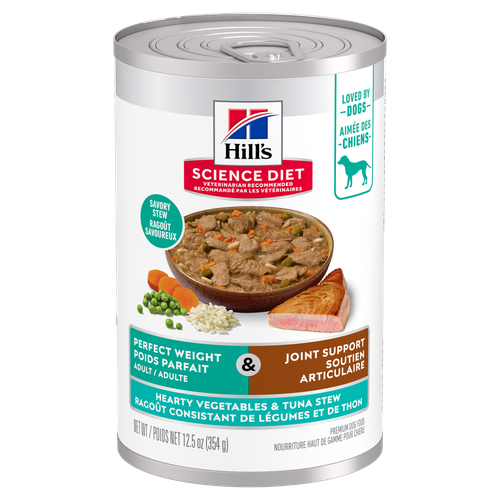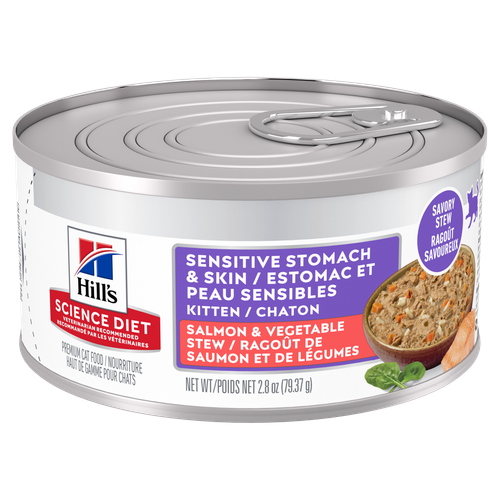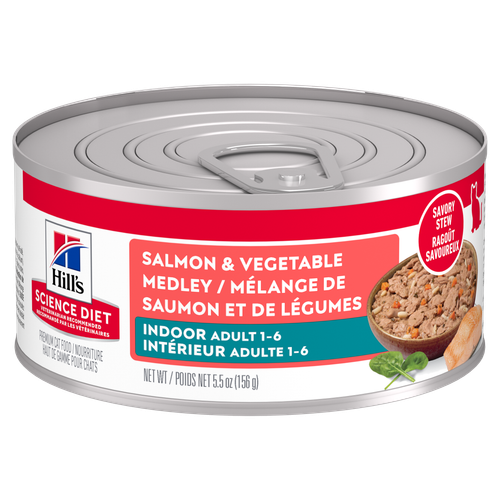
-
Find the right food for your petTake this quiz to see which food may be the best for your furry friend.Find the right food for your petTake this quiz to see which food may be the best for your furry friend.Featured products
 Adult Perfect Weight & Joint Support Hearty Vegetables and Tuna Stew Dog FoodShop Now
Adult Perfect Weight & Joint Support Hearty Vegetables and Tuna Stew Dog FoodShop Now Sensitive Stomach & Skin, assortiment de conserves
Sensitive Stomach & Skin, assortiment de conservesHill's Science Diet Sensitive Stomach & Skin Variety Pack
Shop Now Healthy Cuisine, Adulte, assortiment de conserves
Healthy Cuisine, Adulte, assortiment de conservesHill's Science Diet Healthy Cuisine Variety Pack
Shop NowFeatured products Adult Chicken & Spinach Casserole Cat Food
Adult Chicken & Spinach Casserole Cat FoodWith delicious chunks in a decadent gravy
Shop Now Adult 7+ Tender Chicken Dinner Cat Food
Adult 7+ Tender Chicken Dinner Cat FoodWith delicious chunks in a decadent gravy
Shop Now Perfect Weight Salmon & Vegetable Canned Cat Food
Perfect Weight Salmon & Vegetable Canned Cat FoodOver 70% of cats lost weight within 10 weeks when fed this nutrition
Shop Now -
Dog
- Dog Tips & Articles
-
Health Category
- Weight
- Food & Environmental Sensitivities
- Urinary
- Digestive
- Joint
- Kidney
- Dental
- Cancer
-
Life Stage
- Puppy Nutrition
- Adult Nutrition
- Senior Nutrition
Cat- Cat Tips & Articles
-
Health Category
- Weight
- Skin & Food Sensitivities
- Urinary
- Digestive
- Kidney
- Dental
- Stress
- Cancer
-
Life Stage
- Kitten Nutrition
- Adult Nutrition
Featured articles The Incredible Science Behind Your Pet's Microbiome
The Incredible Science Behind Your Pet's MicrobiomeLearn what a pet's microbiome is, how it contributes to your pet's gut & overall health, and why nutrition is important in maintaining healthy microbiomes.
Read More Pet Food Storage Tips
Pet Food Storage TipsDiscover how and where to store your dry, as well as canned, dog and cat food. Learn how to find the "best before" dates on all Hill's pet food packaging.
Read More Compare Your Pet Food's Calories to Other Brands
Compare Your Pet Food's Calories to Other BrandsCompare Hill's Science Diet dog and cat food's calories against other pet food brands and AAFCO recommended maximum calorie count.
Read More -


Related Image Content
What is liver disease?
The liver is an important organ with many functions, including the digestion and conversion of nutrients, the removal of toxic substances from the blood, and the storage of vitamins and minerals. Because the liver works to rid the body of so many different substances, it is susceptible to damage from many different sources. Liver disease results in inflammation, known as hepatitis. If untreated, this can lead to loss of function as healthy liver cells are replaced by scar tissue. Diseases elsewhere in the body can also affect the liver’s function.
Fortunately, liver disease can be effectively managed and progression limited. Many cats go on to live happily years after their diagnosis. Proper nutrition and continuous dialogue with your veterinarian are key to managing your cat’s liver disorder.
What causes liver disease?
Factors that increase your cat’s likelihood of developing liver disease include:
Age: Several diseases, including liver dysfunction, are common in geriatric cats.
Breed: Certain breeds, such as Siamese cats, are more likely to be born with or are prone to develop particular liver problems.
Obesity: Cats that are severely overweight may be more likely to develop liver disease.
Medications and chemicals: Medications containing acetaminophen can damage the liver in cats.
Does my cat have liver disease?
The signs of liver disease can be very similar to those of other conditions. If you notice any of the following signs in your cat, contact your veterinarian for a complete examination.
Symptoms to look out for include:
- Poor or loss of appetite
- Sudden weight loss
- Weight loss
- Jaundice (yellowing of gums, whites of the eyes or skin)
- Increased thirst
- Vomiting or diarrhea
- Changes in behavior
- Excessive drooling
- Lack of energy or depression
Other possible signs of liver disorders include dark-colored urine, pale gums, or a build- up of fluid in the abdomen that could be mistaken for sudden weight gain. Your veterinarian can administer other tests to diagnose liver disease.
IMPORTANT: The signs of liver disease are not very specific, making it difficult to recognize. If obese cats stop eating, there could be fatal complications. Cats that lose their appetite for two to three days may experience Feline Hepatic Lipidosis, a condition associated with a dangerous build-up of fat in the liver that impairs proper function. If your cat is not eating, consult your veterinarian immediately.


Tasty Tips
The importance of nutrition
If your cat is diagnosed, you may be wondering how to take care of your cat with liver disease. Treatment of any hepatic disease is aimed at resting the liver and minimizing those functions that have to do with metabolism of fats, proteins, carbohydrates and drugs. When your cat has liver disease, it’s even more important to feed the right cat food. Feed your cat easily digested carbohydrates, high-quality fats and limited amounts of sodium to control ongoing liver damage and improve liver function.
For accurate diagnosis and treatment options, always consult your veterinarian and ask them to recommend the best food for your cat’s liver health.
Ask Your Veterinarian About Liver Disease:
- Are there any foods I should avoid giving my cat because of her condition?
- Ask how human food may affect your cat’s health.
- Would you recommend a Hill’s® Prescription Diet® cat food for my cat’s liver health?
- Ask about special nutritional concerns for your cat
- How much / how often you should feed the recommended food to your cat
- Discuss which treats you can feed your cat with the recommended food
- How quickly should I expect to see signs of improvement in my cat’s condition?
- Can you provide me with written instructions or a booklet on liver disease for my cat?
- What is the best way (email/phone) to reach you or your hospital if I have questions?
- Ask if you need a follow-up appointment.
- Ask if a reminder email or notice will be sent.


One of our staff authors prepared this article for you
Related products

Supports the health of the whole urinary system with optimal levels of magnesium

Supports kitten growth, digestive health, nourishes skin and promotes a lustrous fur

Over 70% of cats lost weight within 10 weeks when fed this nutrition

Precisely balanced nutrition for indoor cats with the delicious taste of savory salmon and vegetables
Related articles

When you adopt a cat, you don't just gain a best friend; you also save her life. Here's why getting a cat from a local animal shelter makes so much sense.

Discover the benefits of Hill's line of kitten foods and how they provide complete and balance nutrition for growing kittens.

Discover how to identify cat sensitive skin and what you can do to help your cat thrive from head to paw.

What is the best food for an overweight cat? Learn all about weight control food for cats, including what's in it and how it works.

Put your cat on a diet without them knowing
Our low calorie formula helps you control your cat's weight. It's packed with high-quality protein for building lean muscles, and made with purposeful ingredients for a flavorful, nutritious meal. Clinically proven antioxidants, Vitamin C+E, help promote a healthy immune system.
Put your cat on a diet without them knowing
Our low calorie formula helps you control your cat's weight. It's packed with high-quality protein for building lean muscles, and made with purposeful ingredients for a flavorful, nutritious meal. Clinically proven antioxidants, Vitamin C+E, help promote a healthy immune system.

